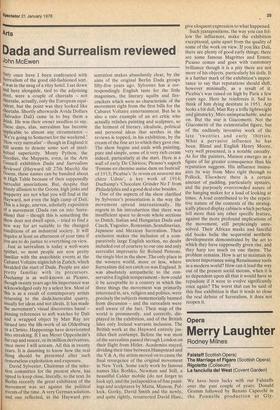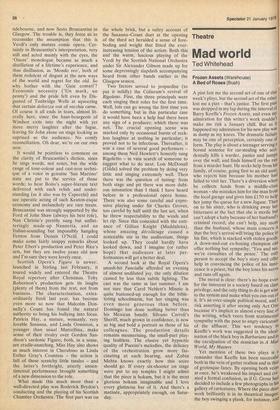Opera
Merry Laughter
Rodney Milnes
Falstaff Scottish Opera) The Marriage of Figaro (Scottish Opera) Rigoletto (Coliseum) La fanciulla del West (Covent Garden)
We have been lucky with our Falstaffs over the past couple of years: Donald Gramm followed by Renato Capecchi in the Ponnelle production at Gly
ndebourne, and now Sesto Bruscantini in Glasgow. The trouble is, they force us to reconsider the assumption that this is Verdi's only mature comic opera. Certainly in Bruscantini's interpretation, very still and acted mainly with the eyes, the `Onore' monologue became as much a distillation of a lifetime's experience, and thus disillusion, as `Mondo reo', both of them redolent of disgust at the new ways of the world and regret for the old. So why bother with the 'Gale comari'? Economic necessity ('Un mark, un penny') and the pride felt even by Disgusted of Tunbridge Wells at squeezing that certain dolcezza out of vecchia came. Of course it all ends in tears, almost literally here, since the haut-bourgeois of Windsor exits into the night with yet more merry laughter after the fugue, leaving Sir John alone on stage looking as suprised as the audience. No comfy reconciliation. Oh dear, we're on our own now.
It would be pointless to comment on the clarity of Bruscantini's diction, since he sings words, not notes, but the wide range of tone-colour and cast-iron technique of a voice in genuine 'San Martino' state are put to the service of those words; to hear Boito's super-literate text delivered with such relish and understanding (as it also was by Capecchi) and see operatic acting of such Keaton-esque economy and melancholy are rare treats. Bruscantini was strongly supported by the Ford of John Shaw (always his best role), Nan Christie's prettily sung but unflatteringly made-up Nannetta, and an Italian-sounding but impossibly hangdog Fenton from Dennis O'Neill. I could make some fairly snappy remarks about. Peter Ebert's production and Peter Rice's sets, but they are twelve years old now and I'm sure they were lovely once.
Scottish Opera's Figaro is newer: launched in Stirling last February, it toured widely and entered the Theatre Royal repertory after Christmas. Toby Robertson's production gets its laughs (plenty of them) from the text, not from business. The characterisation, extraordinarily fresh last year, has become even more so now that Malcolm Donnelly's Count has found the natural authority to bring his bullying into focus.
Patricia Hay, a mature, womanly, very lovable Susanna, and Linda Ormiston, a younger than usual Marcellina, make sense of their rivalry over Gordon Sandison's sardonic Figaro; both, in a sense, are cradle-snatching. Miss Hay also shows as much interest in Cherubino as Linda Esther Gray's Countess — the action is full of these scratchy little tussles — and the latter's forthright, utterly unsentimental performance brought something of a new dimension to the role.
What made this much more than a well-directed play was Roderick Brydon's conducting and the playing of his Scottish Chamber Orchestra. The first part was on the whole brisk, but a sultry account of
the Susanna—Count duet at the opening Theatre of the third act heralded a sense of foreboding and weight that fitted the everincreasing tension of the action. Both this and the warm, luscious playing of the Verdi by the Scottish National Orchestra under Sir Alexander Gibson made up for some depressingly slapdash accompanying
heard from other bands earlier in the Glasgow season.
Two factors served to jeopardise (to put it mildly) the Coliseum's revival of Rigoletto. First, the three principals were each singing their roles for the first time. Well, lots can go wrong the first time you do something, but in this particular case it would have been a help had there been any sign of a producer, which there was not. The crucial opening scene was marked only by occasional bursts of reckless laughter at nothing in particular; it proved not to be infectious. Thereafter, it was a case of several good performers — among them Neil Howlett's honestly sung Rigoletto — in vain search of someone to suggest what to do next. Lois McDonall (Gilda) solved the problem by doing very little and singing extremely well. Then there was the question of tuning: from both stage and pit there was more dubious intonation than I think I have heard before in a professional opera house. There was also some careful and expressive playing under Sir Charles Groves, too careful by half until the last act, when he threw respectability to the winds and let rip. Since this coincided with the entrance of Gillian Knight (Maddalena), whose amazing décolletage caused a noticeable stir in the auditorium, things looked up. They could hardly have looked down, and I imagine (or rather hope) that audiences at later performances will get a better deal.
A second look at the Royal Opera's smash-hit Fanciulla afforded an evening of almost undiluted joy, the only dilution caused by less than subtle lighting. The cast was the same as last summer. I am not sure that Carol Neblett's Minnie is quite buttoned-up enough for the bible
toting schoolmarm, but her singing was even more generous than before.
Domingo has done nothing better than his Mexican bandit. Silvano Carroli's Sheriff, much grown in confidence, is now as big and bold a portrait as those of his colleagues. The production details remains mesmerising, the small-part play ing faultless. The elusive yet hypnotic quality of Puccini's melodies, the delicacy of the orchestration grow more fas cinating at each hearing, and Zubin Mehta knows exactly how this score should go. If every six-shooter on stage were put to my temples I might admit that the piece is hokum, but it is the most glorious hokum imaginable and I love every glutinous bar of it And there's a matinee, appropriately enough, on Saturday.



































 Previous page
Previous page